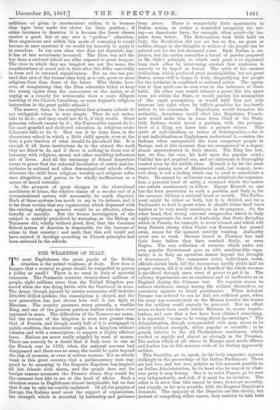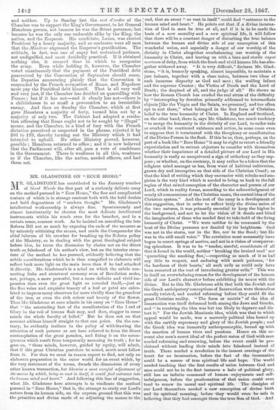THE WEAKNESS OF ITALY.
rpo most Englishmen the great puzzle of the Italian 1._ situation is the patent weakness of Italy. How does it happen that a country so great should be compelled to pursue a policy so small There is no want in Italy of material resources. The Peninsula contains twenty-three millions of people, eight millions more than the United Kingdom pos- sessed when she was doing battle with the Continent in arms. The Army, though injured by unwise economies, still includes 300,000 drilled soldiers, the conscription is obeyed, and the new generation has just shown .bow well it can fight at Mentana. The country possesses many generals, a warlike King, and one of the greatest partizan leaders who have ever appeared in arms. The difficulties of the Treasury are many, but the revenue of the kingdom is even now greater than that of Prussia, and though nearly half of it is mortgaged to public creditors, the remainder ought in a kingdom without colonies and with a conscription, to support a highly efficient force. Nations are never really crippled by want of money. There can scarcely be a doubt that if Italy were to rise as the French rose in 1793, when the national revenue had disappeared and there was no army, she would be quite beyond the risk of invasion, or even of serious menace. Yet so utterly weak is this great country, that a parliamentary vote sup- posed to be annoying to the Emperor Napoleon has inspired all her friends with alarm, and the people dare not for foreign reasons nominate the Premier whom they would for the moment best like to see at the head of affairs. Such a situation seems to Englishmen almost inexplicable, but we fear that it can be only too readily explained. Of all the peoples of Europe, the Italians need most the support of organization, the strength which is accorded by leadership and guidance from above. There is wonderfully little spontaneity in Italian action, or rather a wonderful incapacity for act- ing—as Americans have, for example, often acted—by im- pulse from below. The Reformation took little hold on Italy, the Revolution did not set her on fire, no great or sudden change in the thoughts or wishes of the people can be pointed out for the last thousand years. Each Italian is ex- plosive, but the nation resembles a barrel of powder prepared on Mr. Gale's principle, in which each grain is so separated from each other by intervening crystals that explosion is scarcely to be hoped or feared. The spirit of her ancient civilization, which produced great municipalities, but not great States, seems still to linger in Italy, disqualifying her people for the initiative in combined or national action. The opera- tion of that spirit can be seen even in the influence of Gari- baldi. No other race would tolerate a power like his, apart from yet within the State, or would pardon his assumption of the regal prerogative, or would hold him not only innocent but right when he inflicts penalties for insubordi- nation to his commands. Englishmen would formalize his authority, Americans would elect him Regulator, French- men would make him in some form Chief of the State. Only Italians would invest a partizan with the preroga- tives of a King, yet leave him a private citizen. This spirit of individualism, or rather of disintegration,—for it is not individualism as Englishmen understand it, —makes the Italians, when unorganized, the least competent people in Europe, and at this moment they are unorganized to a degree almost unprecedented in their annals. The King has lost, lost, we fear, for ever, his hold upon the popular mind ;. Cialdini has not acquired one, and no statesman is thoroughly trusted even by the middle class. Ricasoli is by far the most respected among men of Ministerial rank, but respect, how- ever deep, is not a feeling which can be used to consolidate a State. He cannot be, as Cavour was, a substitute for organiza- tion, a personal bond of unity, a standard which the nation was certain unanimously to follow. Except Rioasoli no one has the least pretension to such a position, and Italy is, for the moment, without a national heart or month. The Parlia- ment might be either or both, but it is divided, and for a Parliament to lead in great crises it should either itself have leaders or be very nearly unanimous in its purposes. On the other hand, that strong external compression which in Italy might compensate for want of leadership, that State discipline which in Prussia, for example, is never relaxed, and which will keep Prussia strong when Count von Bismarck has passed away, seems for the moment entirely wanting. Authority never was so weak. Decrees issued in Florence lose half their force before they have reached Sicily, or even Naples. The very collection of revenue, which under our own popular Government goes on with machine-like regu- larity, is in Italy an operation almost beyond the strength of Government. The communes resist, individuals resist officials shrink back, till the income-tax hardly yields half its proper return, till it is said that a fourth of the whole revenue is sacrificed through mere want of power to get it in. The military departments are as cumbrous and as ineffective as in England .during tho Crimean war. No superior seems to enforce obedience, except among the soldiers themselves, no contractor appears to dread punishment. When Admiral Persano was ordered to sea he had not sufficient guns, when the army was concentrated on the Roman frontier the horses for the artillery could scarcely be procured. Not an effort seems to have been made before Mentana to secure breech- loaders, and now that a few have been obtained something, it is reported, "seems to be wrong about the cartridges." The Administration, though over-provided with men, seems to be utterly without strength, either popular or scientific ; to be grossly inferior to the old Piedmontese machinery, which worked as rapidly and alm3st as strongly as the Prussian. The nation which of all others in Europe most needs officers and leaders has in this anxious crisis of its destiny apparently neither.
This flaccidity, so to speak, in the body corporate, appears strikingly in the proceedings of the Italian Parliament. There are just two, and but two, policies as this moment possible to an Italian Administration, be its head who he may or to what- ever party it may belong. One is to resist France, go its own way independently, and risk, if it must be, an invasion. The other is to avow that this cannot be done, to accept necessity, and comply, so far as is possible, with the Emperor Napoleon's demands. The majority of the Deputies see this clearly, but instead of compelling either course, they contrive to take both and neither. Up to Sunday last the mot d'ordre of the Chamber was to support the King's Government, to let General Menabrea govern, not because he was the fittest governor, but ' because he was the only one endurable alike by the King, the nation, and the Emperor. His candfdate, Lanza, was elected President by a heavy majority, and so moderate were all men that the Moniteur expressed the Emperor's gratification. The attitude, in fact, was one of angry but restrained patience, not undignified, and most decidedly practical. If it obtained nothing else, it secured time in which to reorganize the army. Even while holding it, however, the Chamber voted unanimously that the payment of the Pontifical debt guaranteed by the Convention of September should cease, the Deputies announcing plainly that the Convention is suspended by the French occupation of Rome, and Napoleon must pay the Pontifical debt himself. That is all very well and very just, if the Chamber has decided on quarrelling with France ; but if it has not—and it clearly has not—there is a childishness in so small a provocation to an irresistible enemy. And then on Sunday the Chamber, which at first gave Menabrea a majority of forty, turned him out by a majority of only two. The Cabinet had adopted a resolu- tion affirming that Rome ought not to be sought by "illegal" means, and the Chamber, in a kind of fury with the French dictation perceived or suspected in the phrase, rejected it by 201 to 199, thereby turning out the Ministry which it had intended to uphold. No other Ministry proved, however, possible ; Menabrea returned to office ; and it is now believed that the Parliament will, after all, pass a vote of confidence in the Government. There is weakness in all this, weakness as if the Chamber, like the nation, needed officers, and had them not.































 Previous page
Previous page